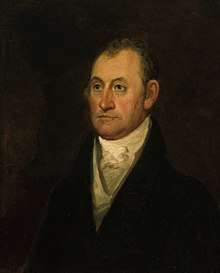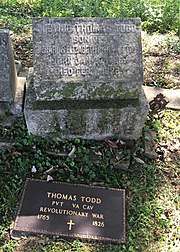Thomas Todd
Thomas Todd (January 23, 1765 – February 7, 1826) was an American attorney and Associate Justice of the U.S. Supreme Court. Raised in the Colony of Virginia, he studied law and later participated in the founding of Kentucky, where he served as a clerk, judge, and justice. He was married twice and had a total of eight children. Todd joined the U.S. Supreme Court in 1807 and his handful of legal opinions there mostly concerned land claims.
Thomas Todd | |
|---|---|
 | |
| Associate Justice of the Supreme Court of the United States | |
| In office March 3, 1807 – February 7, 1826 | |
| Nominated by | Thomas Jefferson |
| Preceded by | Seat established |
| Succeeded by | Robert Trimble |
| Chief Justice of the Kentucky Court of Appeals | |
| In office December 13, 1806 – March 3, 1807 | |
| Preceded by | George Muter |
| Succeeded by | Felix Grundy |
| Associate Justice of the Kentucky Court of Appeals | |
| In office December 19, 1801 – December 13, 1806 | |
| Preceded by | Seat established |
| Succeeded by | Robert Trimble |
| Personal details | |
| Born | January 23, 1765 King and Queen County, Virginia, British America |
| Died | February 7, 1826 (aged 61) Frankfort, Kentucky, U.S. |
| Political party | Democratic-Republican |
| Spouse(s) | Elizabeth Harris Lucy Payne (1812–1826) |
| Education | Washington and Lee University (BA) |
Early life
Todd was born in King and Queen County, Virginia, on January 23, 1765.[1] He was the youngest of five children. Both of his parents died when he was young. He was raised Presbyterian. At the age of 16, Todd served as a private in the Continental Army with a company of cavalry from Manchester, Virginia in the American Revolutionary War. Upon returning home, he attended Liberty Hall Academy (now Washington and Lee University) in Lexington, Virginia, and graduated in 1783.[1]
Todd then became a tutor at Liberty Hall Academy in exchange for room and board and instruction in the law. Todd studied surveying before moving to Kentucky County (then part of Virginia) in 1783 when his first cousin, Harry Innes, was appointed to the Kentucky district of the Virginia Supreme Court. Todd read law to gain admission to the Kentucky bar in 1786, but he gained positions of influence by becoming a recorder.
Career
Todd served as the clerk at five constitutional conventions between 1784 and 1792 where Kentucky was seeking statehood. He served as secretary to the Kentucky State Legislature when Kentucky was admitted to the Union in 1792. When the Kentucky Court of Appeals, the State's highest court, was created in 1789, Todd became its chief clerk. He also maintained a private practice in Danville, Kentucky from 1788 until 1801, when Todd was appointed a Justice of the Kentucky Court of Appeals. In 1806 he was elevated to Chief Justice.
Marriage
Todd married Elizabeth Harris in 1788 and they were the parents of five children: Millicent (c. 1789–1810), Charles Stewart (1791–1871), John Harris (1795–1824), Ann Maria (1801–1862) and Elizabeth Frances (1808–1892).
On March 29, 1812, two years after his first wife died, Todd married Lucy Payne Washington, the youngest sister of Dolley Madison[1] and the widow of Major George Steptoe Washington, who was a nephew of President George Washington. It is believed to be the first wedding held in the White House.[2] Their children were: James Madison (1817–1897), William J. and Madisonia.
Appointment to the Supreme Court
Todd was nominated to the U.S. Supreme Court by President Thomas Jefferson on February 28, 1807, after Congress raised the number of seats on the court to seven. He was confirmed by the United States Senate on March 2, 1807, and received his commission the following day. He is one of 19 Presbyterians to have served on the Court.[3] He served as a Supreme Court Justice until his death in February 1826.
Court opinions
Todd served under Chief Justice John Marshall. Politically, Todd was a Jeffersonian.[1] Although they had different political beliefs, Todd adopted Marshall's views on judicial interpretation, but did not write a single constitutional opinion. He was labelled the most insignificant U.S. Supreme Court justice by Frank H. Easterbrook in The Most Insignificant Justice: Further Evidence, 50 U. Chi. L. Rev. 481 (1983). Todd wrote only fourteen opinions—eleven majority, two concurring and one dissenting. Ten of his eleven majority opinions involved disputed land and survey claims.
Todd's first reported opinion was a dissent to the opinion of Chief Justice Marshall in Finley v. Lynn. He concurred in all other opinions written by the Chief Justice. One of the more interesting of these cases was Preston v. Browder, where Todd upheld the right of North Carolina to make land claim restrictions on filings that were made in Indian territory and violated the Treaty of the Long Island of Holston made by the state on July 20, 1777. His opinion in Watts v. Lindsey's Heirs et al., explained confusing and complicated land title problems which plagued early settlers of Kentucky.
Todd's only Court opinion which did not involve land law was his last. In Riggs v. Taylor, the Justice made the important procedural ruling, now taken for granted, that if a party intends to use an original document as evidence, then the original must be produced. But if the original is in the possession of the other party to the suit, who refuses to produce it, or if the original is lost or destroyed, then secondary evidence will be admitted.
Death and legacy

Todd died in Frankfort, Kentucky on February 7, 1826 at the age of 61. He was initially buried in the Innes family cemetery. Later, his remains were removed to Frankfort Cemetery, overlooking the Kentucky River and the Kentucky State Capitol.[4]
At the time of his death, Todd was vested with substantial real property, particularly in Frankfort. He was a charter member of the Kentucky River Company, the first business formed to promote Kentucky waterway navigation. The inventory of his estate revealed he was a shareholder of the Kentucky Turnpike, (the first publicly improved highway west of the Alleghenies), and the Frankfort toll bridge, crossing the Kentucky River. In addition to his home, he owned more than 7,200 acres (29 km2) of land throughout the state and another twenty or so pieces in Frankfort. After his children were provided for, as he put it, in "their full proportion", the remainder of his estate valued at more than $70,000—a large sum at the time.[5]
Todd's papers are kept in three locations:
- Cincinnati Historical Society, Cincinnati, Ohio.
- The Filson Historical Society, Louisville, Kentucky.
- University of Kentucky, Margaret I. King Library, Lexington, Kentucky.[6]
During World War II the Liberty ship SS Thomas Todd was built in Brunswick, Georgia, and named in his honor.[7]
Memberships and other honors
Todd became a member of the American Antiquarian Society in 1820.[8] He was also a Freemason.[9]
See also
- List of Justices of the Supreme Court of the United States
- Marshall Court
- United States Supreme Court cases during the Marshall Court
References
Citations
- Kleber, John E. (ed.) (1992). The Kentucky Encyclopedia, p. 888. The University Press of Kentucky. ISBN 0-8131-1772-0.
- "Archived copy". Archived from the original on 2011-05-26. Retrieved 2011-03-13.CS1 maint: archived copy as title (link)
- "Religion of the Supreme Court". www.adherents.com.
- The Kentucky Encyclopedia, p. 888
- Biography and Bibliography, Thomas Todd Archived 2008-09-20 at the Wayback Machine, 6th Circuit United States Court of Appeals.
- Location of Thomnas Todd Papers Archived 2007-03-17 at the Wayback Machine, 6th Circuit U.S. Court of Appeals.
- Williams, Greg H. (25 July 2014). The Liberty Ships of World War II: A Record of the 2,710 Vessels and Their Builders, Operators and Namesakes, with a History of the Jeremiah O’Brien. McFarland. ISBN 1476617546. Retrieved 9 December 2017.
- "MemberListT".
- "TODAY in Masonic History: Thomas Todd Passes Away". masonrytoday.com. February 7, 2016. Retrieved August 29, 2019.
Sources
- Oyez Project, Supreme Court Media, Thomas Todd
- The Adherents, Religious Affiliation of Supreme Court Justices.
- https://www.law.cornell.edu/supct/justices/histBio.html#todd
- Biography and Bibliography, Thomas Todd, 6th Circuit United States Court of Appeals.
- Thomas Todd at the Biographical Directory of Federal Judges, a public domain publication of the Federal Judicial Center.
Further reading
- Abraham, Henry J. (1992). Justices and Presidents: A Political History of Appointments to the Supreme Court (3rd ed.). New York: Oxford University Press. ISBN 0-19-506557-3.
- Cushman, Clare (2001). The Supreme Court Justices: Illustrated Biographies, 1789–1995 (2nd ed.). (Supreme Court Historical Society, Congressional Quarterly Books). ISBN 1-56802-126-7.
- Flanders, Henry. The Lives and Times of the Chief Justices of the United States Supreme Court. Philadelphia: J. B. Lippincott & Co., 1874 at Google Books.
- Frank, John P. (1995). Friedman, Leon; Israel, Fred L. (eds.). The Justices of the United States Supreme Court: Their Lives and Major Opinions. Chelsea House Publishers. ISBN 0-7910-1377-4.
- Hall, Kermit L., ed. (1992). The Oxford Companion to the Supreme Court of the United States. New York: Oxford University Press. ISBN 0-19-505835-6.
- Martin, Fenton S.; Goehlert, Robert U. (1990). The U.S. Supreme Court: A Bibliography. Washington, D.C.: Congressional Quarterly Books. ISBN 0-87187-554-3.
- Urofsky, Melvin I. (1994). The Supreme Court Justices: A Biographical Dictionary. New York: Garland Publishing. pp. 590. ISBN 0-8153-1176-1.
- White, G. Edward. The Marshall Court & Cultural Change, 1815–35. Published in an abridged edition, 1991.
External links
| Wikisource has original works written by or about: Thomas Todd |
| Legal offices | ||
|---|---|---|
| New seat | Associate Justice of the Kentucky Court of Appeals 1801–1807 |
Succeeded by Robert Trimble |
| Preceded by George Muter |
Chief Justice of the Kentucky Court of Appeals 1806–1807 |
Succeeded by Felix Grundy |
| New seat | Associate Justice of the Supreme Court of the United States 1807–1826 |
Succeeded by Robert Trimble |

